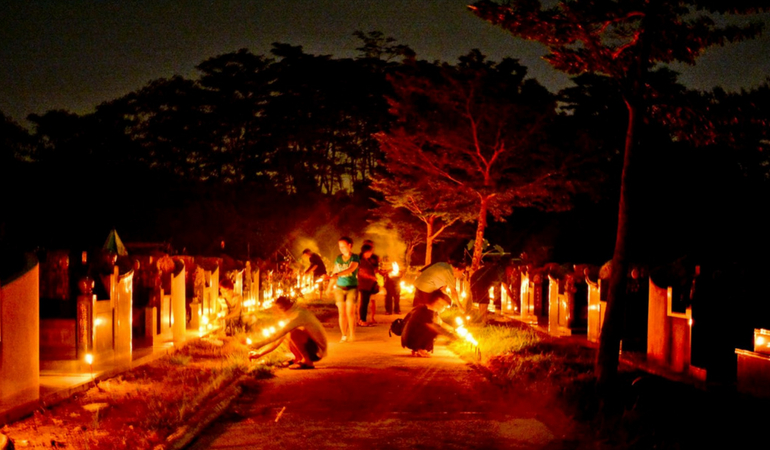This article is part of our Hungry Ghost Festival Family Guide. Sign up for our newsletter to receive our best activity, recipe and craft ideas before every Chinese holiday.
The Hungry Ghost Festival is a time when restless ghosts rise, when makeshift roadside altars glow with burning joss paper and when the living do everything they can to appease the wandering spirits. It’s one of the two big annual festivals designated specifically for the dead — the other is the Qingming Festival in the spring.
The Story of Ghost Month
Ghost Month lasts the duration of the 7th month on the lunar calendar. The Chinese believe that the gates to the underworld are opened on the 1st day of the month, releasing the captive ghosts to roam the earth among the living until the gates are closed again on the last day of the month. In contrast to the Qingming Festival, which honors family ghosts and ancestors, the Hungry Ghost Festival is intended to pacify the restless ghosts of strangers and uncared-for dead. That is, spirits who did not receive a proper burial or those who died through murder or suicide. During the duration of Ghost Month, the spirits seek out worldly pleasure and even revenge against those who did them harm while they were alive. To pacify these hungry ghosts, the living observe superstitions and make offerings of food, money and entertainment all month long, culminating with an outdoor ghost-feeding ceremony on the night of the Hungry Ghost Festival. It’s believed that content ghosts won’t cause trouble, especially for those among the living who faithfully serve them.
The Story of Mu Lian
Though much of the Hungry Ghost Festival’s origin myth is lost to time, many attribute the holiday’s focus on the destitute and less fortunate to the influence of Buddhism. Specifically, there’s a story about Mu Lian, a monk who rescued his mother from hell. Horrified to find his mother committed to the fiery depths of the underworld, Mu Lian appeals to Buddha for help. He’s told in response that only the power of joy harnessed through the collective effort of mass prayer could save her. When the ritual is performed by the Buddha and his disciples on the 15th day of the 7th lunar month, Mu Lian’s mother is released. Many point to this story as the reason why the Hungry Ghost Festival focuses so much on easing the suffering of the wandering ghosts, as well as exonerating their spirits.
When is the Hungry Ghost Festival?
The Hungry Ghost Festival takes place every year on the evening of the 15th day of Ghost Month, the 7th month on the lunar calendar. There is no time off granted for the Hungry Ghost Festival.
Hungry Ghost Festival Dates Through 2026 are below.
| Year | Date |
|---|---|
| 2015 | August 28 |
| 2016 | August 17 |
| 2017 | September 5 |
| 2018 | August 25 |
| 2019 | August 15 |
| 2020 | September 2 |
| 2021 | August 22 |
| 2022 | August 12 |
| 2023 | August 30 |
| 2024 | August 18 |
| 2025 | September 6 |
| 2026 | August 27 |
Your turn! Do you have any other questions about Hungry Ghost Festival history and folklore? I’d love to hear from you in the comments section below!
HT: Photo by the photojournale.





Tony Perez
Is it all right to afterward eat the food we offered or give it to the poor and hungry? If not, what do we do with the food?
Wes Radez
Thanks for your question, Tony. Traditionally, the offering is left outside overnight before it’s generally cleared away, either by municipal services or the family. That said, you’ve got spirit of the holiday right, in the sense of looking after those less fortunate. Giving non-perishable goods to a homeless shelter might be your family’s modern adaptation. ~Wes
Gary
Hello, I’m currently engineering a fall festival with my students. One of the cultures and settings of the event is the “Hungry Ghost Festival.” Could you possibly share your thoughts as to the must haves a person would find in my little Chinese village if the “Hungry Ghost Festival” were taking place. I’m looking for attributes which will provide a more sound cultural experience. Thank you.
Wes Radez
Hi Gary, sounds like fun! You’ll find more detail in the site’s Hungry Ghost Festival pages, but at a high level, I’d suggest emphasizing the theme of looking after the destitute and those less fortunate, specifically in this case the ghosts without families to look after them. Taking care to avoid cultural caricature, an interesting display might incorporate elements of a traditional ghost-feeding ceremony, such as paper and food offerings meant to appease the passing ghosts. In summary, focus on the holiday’s universal, accessible themes, supported by explanations of the specific cultural practices. Hope that helps! ~Wes
Gary
Thank you. I had incorporated the Chinese lantern festival a few years back which was a huge success and am looking forward to this event as well.
Wes Radez
Excellent! If there’s an easy opportunity, I’d love to see a picture when the event is past. ~Wes
Wei Guan Shang
There is so much similarity in the diverse cultural traditions honoring the dead. There are the bright and cheerful aspects and then there are the dark and fearful ones as stark contrast and so many variations in between. I would like to add that our remembrance of the dead can be on a daily basis via sincere prayers offered and in good deeds done on behalf of the deceased. What we do and what we fail to do in this life have a great impact on all our own lives here and on our afterlife…so vigilance, or the lack of, to our true and noble heritage not only impacts upon advancing the betterment of our world and all in it, our pure, kindly, goodly deeds and seemly conduct affects those in the next world as well. Wei
Wes Radez
Thank you for sharing your reflection and daily practice, Wei. Very much agree. ~Wes